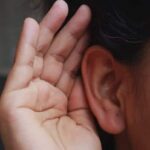Appreciative Listening: the Definition and Basics

Appreciative listening: this article provides a practical explanation of Appreciative Listening. Next to what it is (definition), this article also highlights the basic 3 factors and a short summary. After reading, you’ll understand the basis of this communication theory. Enjoy reading!
What is Appreciative Listening? The definition and meaning
Appreciative listening can be defined as a way of listening in which someone actively goes in search of certain auditory information that this person personally appreciates or likes.
Someone may also practice appreciative listening if it contributes to achieving a goal or meeting a need.
For example, one uses appreciative listening when listening to good music, meditation seminars, poetry, audiobooks or a speech from a person with an excellent reputation.
What specific auditory information is valued differs from person to person. Human perception has a lot to do with this. Some people do not like opera and find it too dramatic or complicated, while others like it.
Perception can change when, for example, opera is sung in a new style. Past experiences also have a direct impact on the perception of auditory information and the way in which this is listened to. A song from childhood can evoke pleasant memories, making it more likely that listening to this will be appreciated in old age.
In other words, people also engage in Appreciative Listening for the joy of it. Although it doesn’t demand a lot of focus, a person can become temporarily absorbed in the moment of listening.
In this respect, it is a lot like listening to sounds from the social environment, for example hearing the stories of a grandmother while in the football stands.
The big difference between appreciative listening and only hearing and nodding is that with social listening visions, ideas and reactions are formed based on the person.
In Appreciative Listening it is purely about the listener’s reaction, not about the source of the sound.
Other ways of listening include: evaluative listening, listening extensively, empathetic listening and critical listening.
The 3 factors of Appreciative Listening
How someone absorbs the information, including auditory information, is influenced by a large number of factors. This often also depends on the perceptions of others.
One friend sends a song to another with the message, “this is a really good song”. This increases the chance that the receiver will also think the song is good.
Appreciative Listening is also subjective. The extent to which a person can appreciatively absorb the auditory information depends largely on three factors:
Presentation
The presentation is very important for the way in which auditory material is interpreted. Keep in mind, for example, the medium and the setting. Listening to a live classical music concert is completely different from listening to classical music via the music player at home or in the car.
Seeing an orchestra consisting of different groups of people with different instruments affects the listener’s experience. This is why the medium is very important. The environmental factors also play an important role in this.
If it is incredibly hot in the concert hall, this can affect the way in which people absorb what they’re listening to. However, it does not change the action and type of listening. A true enthusiast can still appreciate the music even in a sweltering setting.
Presentation includes many factors: the medium, environment and style or personality of the presenter. Sometimes it is also the perception of the presentation, the next important factor in appreciative listening.
Perception
The opinion or appreciation of a listener about the auditory material that they’re receiving plays a major role in appreciative listening and can change quickly. After hearing a good presentation from a presenter, the perception of the presenter and the presentation can change completely because of new information during the break. This can also happen while listening.
For example, in a particular music genre, the listener must be familiar with the different forms of the genre to know what is appreciated and what is not. It is also important that a person is open to the new auditory material.
For instance, if someone is convinced for years that rock music is not for them, the music is probably not going to be appreciated if this person has to listen to rock music. However, if they later meet someone they appreciate or admire a great deal, this may be just the thing to get the foot in the door.
Perceptions affect all areas of life. These are crucial factors that determine whether something can or cannot be appreciated. The perception determines first what will be listened to.
The Complete Communication Skills Master Class for Life
Past experiences
Some people enjoy the sound produced by a big city. Maybe growing up in a big city was a happy experience for them so they appreciate hearing these sounds. Other people, raised in the countryside, appreciate the often subtle sounds of nature more. They derive their pleasure from a walk through the country.
The observation of auditory material can be clearly influenced by past experiences and it has an impact on whether or not someone enjoys listening to certain sounds.
The willingness to listen to new things can also become stronger or weaker. Pleasant memories increase the readiness and unpleasant memories weaken the willingness to listen to new things.
However, it is important to remain open to new things and experiences. Listening skills and also the appreciation for new information or styles can be developed further.
Appreciative Listening: to summarise
Many people consider the act of listening as a matter of course and do not think that the appreciation for a particular type of auditory material can arise if it wasn’t previously appreciated.
Nevertheless, the three factors that determine whether the auditory material can be appreciated – presentation, perception and past experiences – can, to a certain extent, influence whether or not one is able to appreciate new music.
Now It’s Your Turn
What do you think? Are you familiar with this explanation of appreciative listening? What do you think are contributing factors to the appreciation of certain sounds? Are you open to new auditory material or have you developed a certain resistance? Do you think you can become more open after reading the information in this article?
Share your experience and knowledge in the comments box below.
More information
- Mendelsohn, D. J. (1984). There ARE Strategies for Listening.
- Nunan, D. (2002). Listening in language learning. Methodology in language teaching: An anthology of current practice, 238-241.
- Wolvin, A. D., & Coakley, C. G. (1985). Listening. Wm. C. Brown Publishers, 2460 Kerper Blvd., Dubuque, IA 52001.
- Walker, T. J. (2023). The Complete Communication Skills Master Class for Life. Retrieved 01/19/2024 from Udemy.
How to cite this article:
Janse, B. (2018). Appreciative Listening. Retrieved [insert date] from Toolshero: https://www.toolshero.com/communication-methods/appreciative-listening/
Originally posted on: 11/14/2018 | Last update: 01/19/2024
Add a link to this page on your website:
<a href=”https://www.toolshero.com/communication-methods/appreciative-listening/”>Toolshero: Appreciative Listening</a>













2 responses to “Appreciative Listening: the Definition and Basics”
Usually I never comment on articles but really your article is so informative.
Thank you for your comment, Aditya.